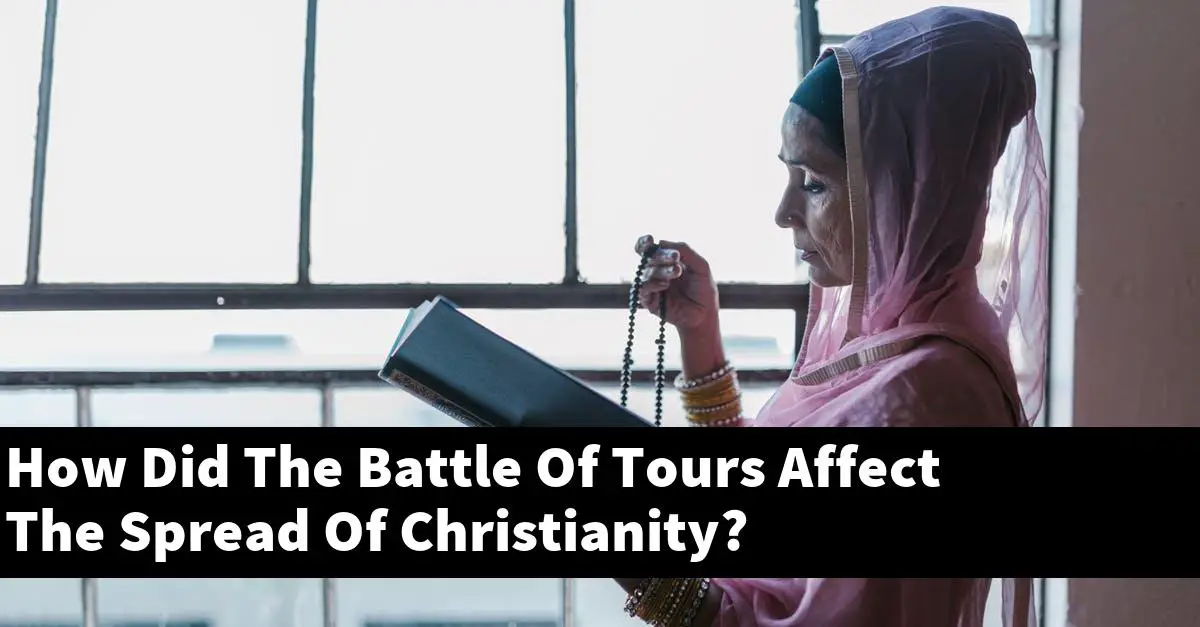The Battle of Tours, also known as the Battle of Poitiers, was fought in 732 between the Frankish army of Charles Martel and the Umayyad army of Abdul Rahman Al Ghafiqi. The battle was a victory for the Franks, and it stopped the Muslim advance into Western Europe.
The victory also had a significant impact on the spread of Christianity, as it showed that the Frankish kingdom was a powerful force that could protect Christian Europe from Muslim invaders.
What was the impact of the Battle of Tours?
The Battle of Tours was fought on October 10th, 732 AD, and was one of the decisive battles of the Muslim surge towards Europe. The Muslims, commanded by General Amr ibn al-As, routed the Christian defenders, led by the Duke of Tours, and captured the city.
The victory allowed the Muslims to extend their control over much of the Mediterranean region.
What is the Battle of Tours and why was it significant?
The Battle of Tours was fought in August or September of 732 between the forces of the Eastern Roman or Byzantine Empire and the forces of the Frankish kingdom of Austrasia. The battle was significant because it ended the long-running conflict between the two countries, and it also demonstrated the power of the Frankish kingdom.
What happened after Battle of Tours?
The Battle of Tours, fought in October 732 between the Frankish armies of Charles Martel and Walid I ibn al-Mundhir, ended in a decisive victory for the Franks. The battle marked the turning point in Franks’ march to undisputed mastery of the middle-eastern Islamic world.
Following the battle, Charles Martel continued his march east, occupying Damascus and Aleppo in 733, and then marched south into southern Iraq. He successfully converted the powerful Abbasid Caliph, al-Mansur, to Christianity in 735, which helped solidify Frankish hegemony in the region.
In 737, Charles Martel decisively defeated an Arab army at the Battle of Zab, thus securing his hold over the eastern provinces of Syria.
Charles Martel died in 741, and was succeeded by his son, Pepin the Short. Pepin continued his father’s conquests, expanding Frankish rule into southern Italy, Sicily, and North Africa.
In 751, he defeated an Arab army at the Battle of the Great River, which ended Muslim control over southern Spain. In 756, Pepin’s army invaded northern Italy, and in 774 he defeated an Arab army at the Battle of Pavia, which ended Muslim control over northern Italy.
Why was the Battle of Tours significant quizlet?
The Battle of Tours, also known as the Battle of Poitiers, was a decisive battle of the Third Crusade that took place on September 20, 1097, near Tours in central France. The Muslim army, led by Saladin, was victorious over the Christian forces, led by King Philip II of France and Raymond of Toulouse.
The battle ended the Christian attempt to regain control of the Holy Land.
How did African states change as a result of the spread of Islam?
The spread of Islam in Africa had a profound impact on the continent’s states. In many cases, where the Muslim population was concentrated, the states were transformed into Muslim majority states.
In others, where Islam was not as well-integrated, the states remained largely Christian. This transformation has a number of consequences for the way African states operate today.
First, African states became more centralized and centralizing. This was because the Islamic doctrine of sharia (Islamic law) mandated the establishment of a strong central government to administer religious and legal affairs.
In addition, the spread of Islam led to the creation of new Muslim elites who were able to exert their power through politics.
Second, African states underwent a process of institutionalization. This was because the Muslim religious and legal institutions were very strong and demanded institutional recognition.
This process led to the development of a number of key institutions, such as the Sharia courts, the Islamic university system, and the Muslim parliament.
Third, African states began to adopt a more Muslim-oriented culture. This was because Islam is based on the principle of submission to God, which is at the heart of African culture.
As a result, African states began to adopt Islamic values, such as Sharia law, as the basis of their legal system.
Fourth, African states began to undergo a process of political transformation. This was because the Islamic doctrine of sharia mandated the establishment of a strong government to administer religious and legal affairs.
In addition, the spread of Islam led to the emergence of a new Muslim elite who were able to exert their power through politics.
Finally, African states began to adopt a more Muslim-oriented foreign policy. This was because the Islamic doctrine of sharia mandated the establishment of strong relationships with Muslim countries.
Why was the Battle of Tours so important for Christianity?
The Battle of Tours, also known as the Battle of Poitiers, was a decisive battle of the Third Crusade in which the Christian army of the First Crusade, led by King Louis VII of France, decisively defeated the Muslim army of the Caliph al-Mansur. This victory restored Christian control over the Holy Land, which had been lost to Muslim forces in the previous year.
The Battle of Tours is also significant for its impact on medieval European history, as it marked the beginning of a period in which the Christian Middle Ages emerged as a powerful force in European politics.
How was the Battle of Tours won?
The Battle of Tours was won by the Franks through the use of cavalry. The Frankish cavalry was able to charge the Saracens’ infantry and break through their lines.
This allowed the Franks to penetrate the Saracens’ defenses and defeat them.
What effect did the expansion of Christianity have on Western Europe during the Middle Ages?
The expansion of Christianity during the Middle Ages had a profound effect on Western Europe. The religion made a significant impact on the development of the West, shaping its political, economic, and social institutions.
Christianity also played a significant role in shaping European culture and identity.
How did the Islamic empire impact the areas it ruled?
There are a few ways in which the Islamic empire impacted the areas it ruled. First, the Islamic empire was a major cultural force in the Middle East and North Africa.
This led to major changes in the way these regions were viewed and perceived, and it also influenced the way these regions were populated. Second, the Islamic empire was a major military power.
This led to a significant increase in the amount of land that was under Islamic control, as well as the amount of wealth that was accumulated by the empire. Finally, the Islamic empire also had a significant impact on the way the languages of the regions it ruled were spoken.
This led to the development of new languages, as well as the spread of existing languages into new areas.
What were the two sides of the Battle of Tours?
The Battle of Tours was fought in 732 between the Muslim Arabs led by Muhammad and the Christian Franks under Charles Martel. The Muslims were victorious, and the Franks were forced to retreat north.
Why is Charlemagne important?
Charlemagne was a great leader and emperor who united much of Western Europe under his rule. He was responsible for many important changes in the way the continent was governed, including the establishment of the Holy Roman Empire.
He also played a major role in spreading Christianity throughout Europe.
How did Islam grow and spread?
Islam spread initially through the preaching of the Prophet Muhammad and later through the establishment of Islamic states and empires. Muslims believe that Allah revealed the Quran to Muhammad through the angel Gabriel in the early seventh century AD. Muslims believe that Muhammad was the final prophet of Allah and that Islam is the complete religion that leads to eternal salvation.
Muslims also believe in the oneness of Allah and the prophet Muhammad as the last messenger of Allah. Muslims are called to pray five times a day and to give alms to the poor.
Muslims are also called to fight against unbelievers and to make jihad ( holy war ) against them.
In what ways did the spread of Christianity Islam and modern science give rise to culturally based conflicts?
Christianity, Islam, and modern science all promoted the understanding of natural phenomena and the scientific method. This promoted the growth of empirical knowledge, which in turn gave rise to culturally based conflicts.
For example, the Christian belief in the existence of a divine creator led to conflicts over the interpretation of religious texts, which in turn led to religious wars. Similarly, the Islamic belief in a supreme deity led to conflicts over the interpretation of Sharia law, which in turn led to religious wars.
Modern science also promoted the understanding of human nature, which in turn led to conflicts over the interpretation of scientific data, which in turn led to scientific wars.
How did Islam originate and spread?
Islam is the predominant religion in the world today with over 1.3 billion followers. It originated in the Middle East in the 7th century AD and spread through the Arab world.
Muslims believe that the Quran, the Islamic holy book, was revealed to the prophet Muhammad in Arabic. Muhammad preached Islam, which is based on the belief in one God and the submission to His will, to a largely illiterate population.
Muslims believe that Allah is the one true God and that Muhammad is His prophet. Muslims strive to follow the Quran and the teachings of Muhammad as closely as possible.
Conclusion
The Battle of Tours took place in 732 and was a victory for the Franks over the Islamic Umayyad army. This battle is seen as significant because it halted the advance of Islam into Western Europe and Christianity remained the dominant religion in the region.


